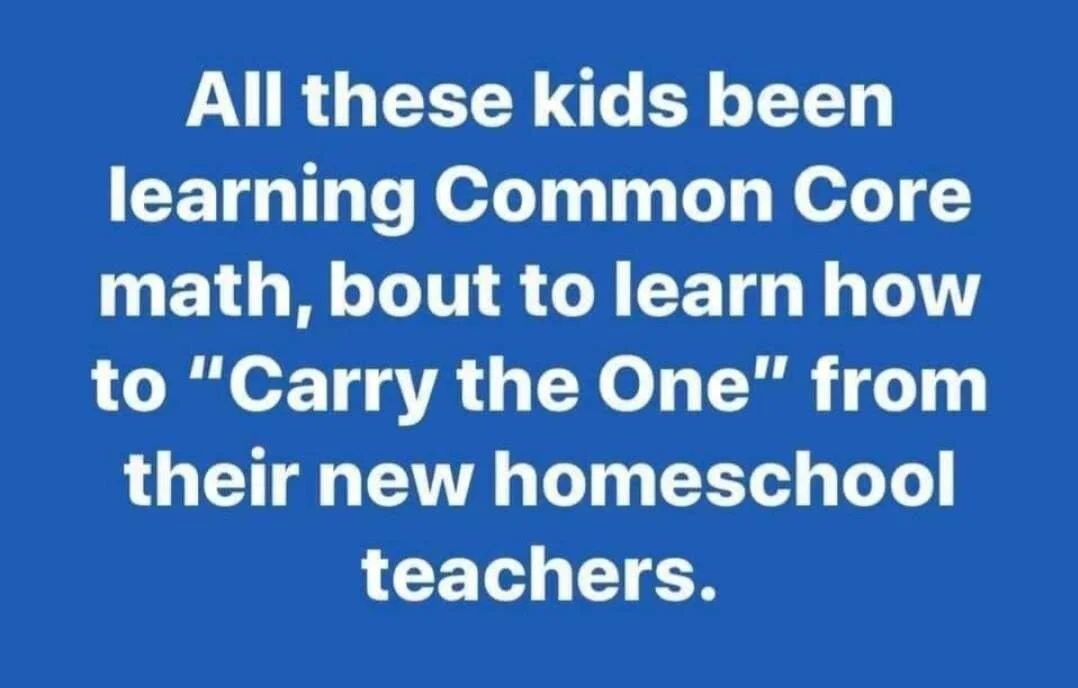Why Common Core Math Has a Bad Rap...But Shouldn't
All these kids been learning Common Core math, bout to learn how to "carry the one" from their new homeschool teachers.
You may have seen memes like this one floating around social media since distance learning began a few months ago and parents were forced into a more active role in their children's Mathematics education. While these may give us a good chuckle, it is important for parents to understand Common Core Mathematics and why their children have been learning math this way for years now. Students in elementary school have ONLY learned mathematics with Common Core. These standards came from the culmination of much research to help students become college and career ready. They came about to address several areas of need in the educational system. See this article for more about the history: https://www.vox.com/2014/10/7/18088680/common-core. Or if articles aren't your jam, check out this quick video.

In a nutshell, Common Core strives to help our children to achieve conceptual understanding and not just rote memorization. When we experience high levels of stress (for example when students take high stakes testing - like the FSA in Florida) our working memory shuts down. The more stressed we become, the harder it is to retrieve things from memory. Thus, when we teach children to memorize, then give them high stakes tests, they shut down and are unable to recall the very information they need to recall! So, what Common Core strives to do is build conceptual understanding. If students have authentic experiences and are engaged in the learning of mathematics, then they have a plethora of experiences to pull from if memory shuts down.

Jo Boaler, a Mathematics Professor out of Stanford University states, "...data from the 13 million students who took PISA tests showed that the lowest achieving students worldwide were those who used a memorization strategy – those who thought of math as a set of methods to remember and who approached math by trying to memorize steps. The highest achieving students were those who thought of math as a set of connected, big ideas." You can find the full article here: https://hechingerreport.org/memorizers-are-the-lowest-achievers-and-other-common-core-math-surprises/.
"No English student would say or think that learning about English is about the fast memorization and fast recall of words." -Jo Boaler

Really though, just think about how the purpose of mathematics has changed. When we were in school our teachers told us stuff like "you won't always have a calculator in your pocket." Well, welcome to 2020 where I do infact have a calculator in my pocket at all times - my smart phone. So it becomes less important for students to memorize and more important for students to become critical thinkers and problems solvers. We, as educators now, are preparing students for jobs that don't yet exist, careers in 2030 and beyond. Students won't need to have facts memorized to be successful in the workforce, they'll need to know how to solve problems, think critically and collaborate.
I found an article and that really helped to put things into perspective. Dr. Keith Devlin, a mathematician at Stanford University wrote "… what is required today is a sufficiently deep understanding of all those procedures, and the underlying concepts they are built on, in order to know when, and how, to use those digitally-implemented tools effectively, productively, and safely.” His article entitled, All The Mathematical Methods I Learned In My University Math Degree Became Obsolete In My Lifetime is worth the read!
So, if nothing else, take this away:

I hope this helps to put things into perspective. While the "new math" may seem confusing for those of us who learned a different way, it is actually great for our students. If parents don't know how to help their child(ren) with this math, they can work on building fluency and reinforcing important skills with games. Game based learning is much more engaging than worksheets for our kids and creates long lasting connections in their brains. The bottom line, don't let your frustration show - whether you are in the role of administrator, teacher or parent. When your frustration shows you can actually have a negative impact on your children's learning! "A team of researchers led by UChicago psychologists Sian Beilock and Susan Levine found that children of math-anxious parents learned less math over the school year and were more likely to be math-anxious themselves—but only when these parents provided frequent help on the child’s math homework." (Allen, 2015) You can learn more in the article Parents’ math anxiety can undermine children’s math achievement.
If you are interested in learning more, we offer professional learning opportunities for educators (both virtual and face-to-face) as well as sessions focused on parents. Email Naomi@GrowingMindsConsulting.com to learn more and/or book a session!

